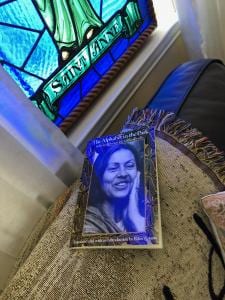 To feel is human, passionate living is divine.
To feel is human, passionate living is divine.
The place of the rational in human life is not made greater by downplaying the need of experience and revelation. From Plato to Part, the wise have known that head listens to the heart and the heart is guided by reason. To live must include doing, making, creating. In his wonderfully profound, comic, and literary work Timaeus, Plato suggested the liver as the organ of revelation. The gods would give wisdom to the liver and this passionate experience, mystical, poetical, a bit mad, should be heeded by the mind! (Buy some.)
Orthodox Christians worship body, soul, and spirit the God who is Divine Logos, Creator, Helper. We may think the faith is reasonable, yet that is not at all inconsistent with the faith being physical. The Word became flesh and was glorious and full of truth. To fracture our experience, the revelation that says “Aha!” when we finally see the beauty in the chicken coop or the possibilities for philosophy in a field of bluebonnets.
I learned much from lilacs in Rochester, rhododendrons in West Virginia.
Before Names
I don’t care about the word, that commonplace.
What I want is the grand chaos that spins our syntax
the obscure birthplace of “of,” “otherwise”
“nevertheless” and “how” and all those inscrutable
crutches I walk on.
Who understands language understands God,
Whose Son is the Word. It kills you to understand.
Words only hide something deeper, deaf, and dumb,
something invented to be silenced.
In moments of grace, rare as they are,
you’ll be able to snatch it out, a live fish
in your bare hand.
Pure terror.
A present help in very time of pandemic is the illuminated soul, Adelia Prado. She is a poet of a place, a region of Brazil, and by herself she makes me wish to read Portuguese. Her poetry is erotic in the Platonic sense: passionate, tied to eating, desire, and physical life. She is not (as my older relatives might have put it) nasty, but also not nice. She recognizes that purity is one with the act of mothering.
I love the bits of the Prado Poetry I have read in English, mostly because she both introduces me to something I can only see, not know, and because she understands something universal. She is not just from Brazil, but from a region of Brazil. I shan’t try to explain the region, how it is different from “greater Brazil,” or what (I am told by commentators) are regional traits. They are far beyond me and in poetry that is felt impossible for me to fully get. This part of Prado is listening, learning, and loving some beauty not mine or my people.
What is common is that she loves the common folk, the wisdom she finds there, the folly, the experience of being who she is. This is just so. My whole life has been improved, educated, made richer by people who nobody describes as elite. There is no division in the soul of this poet between common wisdom and uncommon revelation. She sees that God comes to Mary and Mary inspires Thomas Aquinas and all is made whole.
Here is a poem and a pandemic prayer:
A Sick Man Says a Morning Prayer
By the sign of the Holy Cross,
may my swollen belly come unto You
and my sickness without cure move You, Lord.
I begin my day, I who in my favour
explain that I passed the dark night in wakefulness.
I heard – and this is when at times I rest –
voices from more than thirty years ago.
I saw bright wedges of sunlight in the middle of the night.
My mother spoke to me,
I shooed away cats that licked
the bowl of my childhood.
Deliver me from hurling against You
my body’s sorrow,
its zealous decay.
I must say, to relieve my feelings:
what wrathful love You have.
Take pity on me,
have mercy on me
through this sign of the Holy Cross
which 1 make over forehead, heart, mouth,
from toe tip to head,
from palm to palm.












